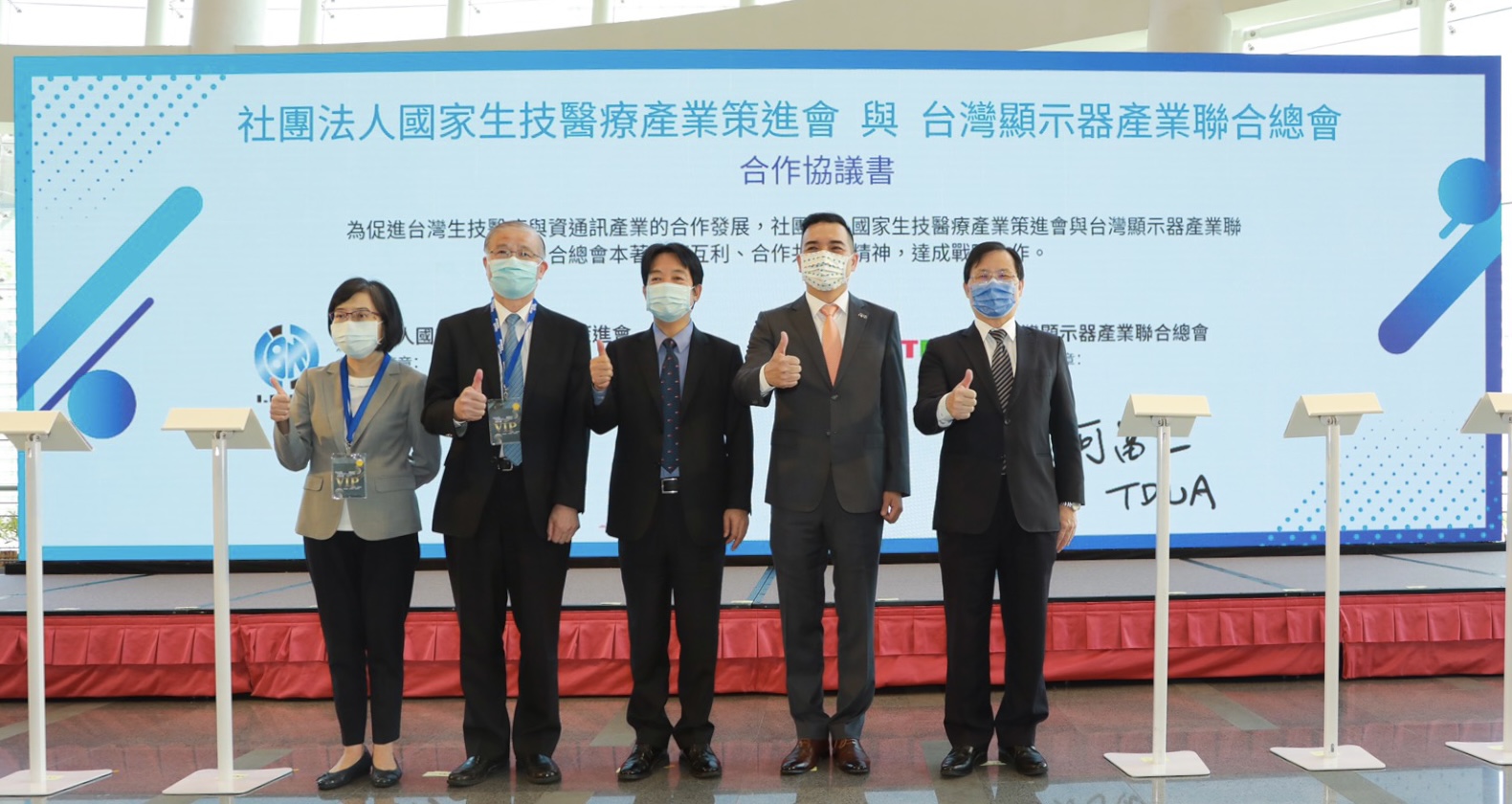
Technology in healthcare: cross-industry partnership agreement launch by IBMI and TDUA
2021-04-28
Source and full stroy by Economic Daily (1) & (2) / written in Chinese
The Institute for Biotechnology and Medicine Industry (IBMI) signed off a partnership agreement with the Taiwan Display Union Association (TDUA), which corresponds to IBMI’s roadmap to achieve the objective of brand building Taiwan’s smart healthcare.

Left to right: Yung-Ming Chang (Secretary General of Ministry of Health and Welfare), Pan-Chyr Yang (Vice President of IBMI), Vice President Lai Ching-te, Frank Ko (Presient of TDUA), Chuan-Neng Lin (Vice Minister, Ministry of Economic Affairs). Photo curtesy of TDUA
Pan-Chyr Yang, Vice President IBMI, addressed in the signing ceremony that the global market size for smart healthcare is forecasted to hit $354 bn by 2025, compared to $144 bn in 2019. The market for precision health is even gigantic- it will reach $3.17 trn by 2025 as opposed to $1.73 trn in 2019.
In terms of displays, Taiwan accounts for 30 per cent of the global share and it provides one half of global medical displays and monitors. Biomedical data collection, compilation and analysis cannot be processed without displays, the focus on developing the display industry may shift from product specifications and pricing to emerging applications in precision health, Yang added.
Home-made smart health products are rarely seen in hospitals here, which explains why display ODM/OEM is the mainstream in Taiwan. According to Yang, the government has turned the tables with policy and regulation backing the use of own brand products. Hospitals are now encouraged to work with display manufacturers under the industry and hospital accreditation framework, namely ‘Taiwan Integrated Biomedical Industrial Center (TCBIC)’ and ‘Regulatory Sandbox’.
Frank Ko, President of TDUA and AU Optronics (AUO), is affirmative about the partnership with IBMI. We aim for co-developing ICT and healthcare sectors with supply chains, demo sites and new operational models. Opportunities are there for Taiwan’s market players, he commented.
The IBMI-TDUA partnership agreement unfolded two strategies, digital transformation in healthcare and cross-industry innovation driven by healthcare and smart display technology.
During the signing ceremony, AUO introduced its medical display panels for CT, MRI and surgery that are capable of showing greater details in medical images as well as presenting a subtle difference between body tissues and fluids. As a result, accuracy and efficiency of diagnosis can be improved.
Precision health is where the future lies
Pan-Chyr Yang, VP of IBMI called for the technology sector to tap into healthcare. He has been the evangelist of precision health in which he believes Taiwan has a competitive edge. Kou-I Yeh, President and Founder of Inventec Group, and Barry Lam, Chairman of Quanta Computer resonated with Yang, they now assume a pivotal role at IBMI.
Not only a country’s competitiveness but also healthcare expenditure can precision health improve. Raising awareness of staying in optimal health is of top priority in response to low birth rate and ageing population, Yang explained.
A financial indicator also suggests opportunities that precision health can bring about. Johnson Health Tech, Dyaco International and Grape King Bio were the top three Taiwan-based biomedical companies by revenue in 2020, taking over companies in medicines. They offer products and services for wellness, fitness and nutrition.
Taiwan is paving the way to precision health using artificial intelligence and emerging technologies. Surgical imaging systems, contactless ECG, early diagnosis of Parkinson's were pointed by Yang as instances how the technology sector can be involved.
To start off biomedical development in Taiwan, demands and supplies must be satisfied in order to reassure investors and insurers to chip in, fund the development of cutting edge technology and promote health and well being, Yang concluded.
Source and full stroy by Economic Daily (1) & (2) / written in Chinese